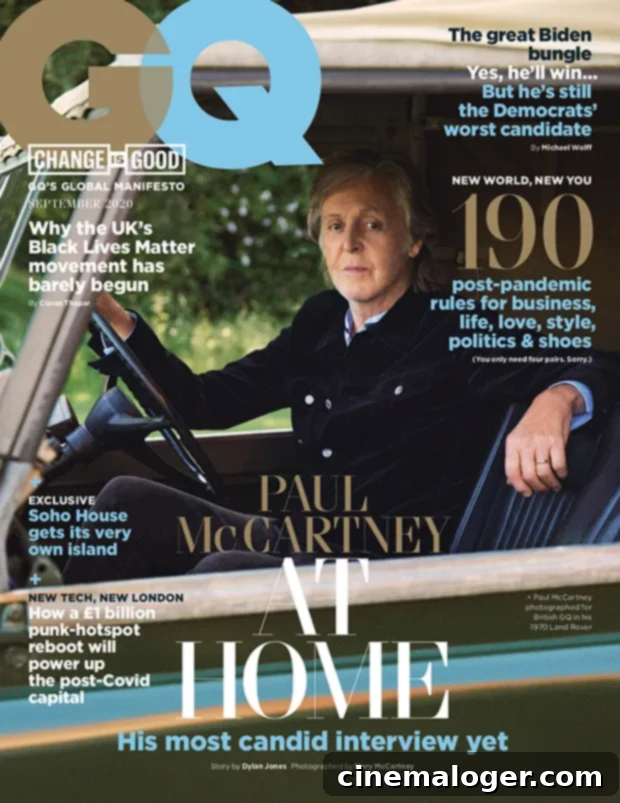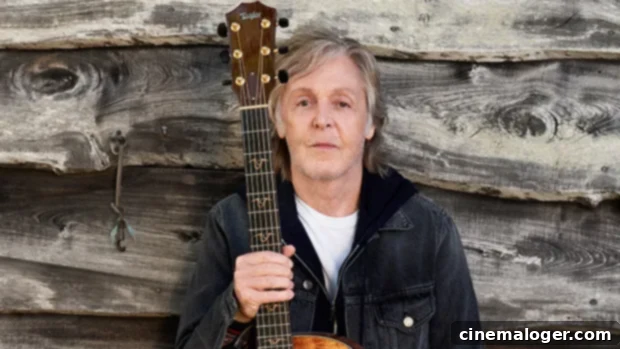Paul McCartney Unveils John Lennon’s Post-Beatles Animosity and Clarifies Lingering Misconceptions About the Iconic Band’s Breakup
For half a century, the monumental shadow of The Beatles’ 1970 breakup has loomed large over music history, sparking endless speculation and debate. The separation of the legendary quartet—Paul McCartney, John Lennon, Ringo Starr, and George Harrison—marked the end of an era that had redefined popular culture for a decade. While their collective achievements remain unparalleled, the narratives surrounding their split have often been shrouded in myth and conjecture. Now, Sir Paul McCartney, at 78, is offering a candid new perspective, aiming to rectify many longstanding misconceptions. In a revealing interview with British GQ, McCartney delved into the tumultuous aftermath of the band’s dissolution, shedding light on the bitter exchanges and the enduring emotional scars, including the origins of Lennon’s pointed 1971 track, “How Do You Sleep?”, a song partially inspired by McCartney himself. His willingness to revisit these painful memories provides invaluable insight into the complex dynamics of a friendship and partnership that shaped the world, offering a more nuanced understanding of this pivotal moment in music history.
The period immediately following The Beatles’ split was fraught with legal wrangling and public acrimony, a painful transition for bandmates who had shared such an extraordinary journey. McCartney vividly recalled one particularly stinging moment during this tumultuous time, highlighting how easily narratives could be skewed and relationships strained. He recounted “reading an article, an interview with Yoko [Ono],” Lennon’s wife and creative partner. McCartney acknowledged Ono’s unwavering loyalty to Lennon, stating, “who, OK, she was a big John [Lennon] supporter, I get that.” However, the content of her remarks was deeply dismissive of his contributions and, in his view, a profound misrepresentation. In the profile for the September issue of British GQ, McCartney detailed how Ono’s assertion—”‘Paul did nothing. All he ever did was book studio'”—left him utterly dumbfounded. This sweeping dismissal of his immense creative output, from countless hit songs and iconic melodies to his pivotal role in the band’s artistic direction and innovations, struck McCartney as not only inaccurate but profoundly insulting. His visceral reaction, “‘Err? No,'” perfectly captures the bewilderment and hurt he felt at such a blatant rewriting of their shared history and his undeniable, foundational impact on the world’s most famous and beloved band. It underscored the deep rift that had formed, as even the historical record was being contested.

It was against this backdrop of escalating tensions and public declarations that John Lennon penned “How Do You Sleep?” for his 1971 album, Imagine. This track stands as one of the most direct and aggressive musical attacks in rock history, a brutal lyrical broadside aimed squarely at his former songwriting partner. McCartney recalled the biting lyric, “and he’s going, ‘All you ever did was ‘Yesterday’…’” The line was a calculated jab, attempting to diminish McCartney’s prodigious talent by reducing his entire body of work to a single, albeit iconic, song. For McCartney, who had co-written dozens of timeless classics, penned some of the band’s most enduring melodies, and was arguably the most prolific melodic innovator in the band, this was a deeply personal slight. He reflected on his internal protest, “‘No, man.'” The pain of being targeted by someone he considered a brother was immense. What makes this revelation even more poignant is McCartney’s assertion that the song’s venomous lyrics weren’t solely Lennon’s spontaneous outpouring of emotion. “But then you hear the stories from various angles and apparently people who were in the room when John was writing that, he was getting suggestions for the lyrics off Allen Klein,” McCartney revealed. Klein, the controversial American businessman and music publisher who controversially took over The Beatles’ affairs in 1969, had become a profoundly divisive figure within the band, particularly clashing with McCartney. This suggests a deliberate, almost collaborative, effort to wound rather than a pure artistic expression, adding a layer of calculated cruelty to the feud and illuminating the external pressures that exacerbated their personal rift.
The revelation that Allen Klein might have actively influenced the lyrics of “How Do You Sleep?” paints a vivid picture of the toxic environment surrounding John Lennon at the time, underscoring the manipulative forces at play. McCartney described “the atmosphere of ‘Let’s get Paul. Let’s nail him in a song…’” as a concerted effort, born from the inner circle Lennon was surrounded by. These were not mere creative differences or friendly competition; they were deeply personal and public attacks that aimed to undermine McCartney’s legacy and integrity. The former Beatles frontman candidly admitted that “And those things were pretty hurtful.” Imagine the emotional toll on a close friend and creative partner, who had spent over a decade building an unparalleled musical empire together, to be subjected to such deliberate malice, crafted within the very industry they had revolutionized. It is understandable that even decades later, recounting such moments of betrayal and animosity remains difficult for McCartney, particularly given the tragic and premature death of John Lennon in New York City in 1980 at the age of 40. Lennon’s passing froze their relationship in time, leaving many wounds unhealed and questions unanswered about potential reconciliation. Yet, McCartney, ever reflective, is no stranger to the public’s often-simplistic assumptions about the band’s intricate and often tumultuous breakup, recognizing that the public narrative frequently lacked the nuance and emotional complexity of their deeply intertwined lives.
Indeed, for many fans and critics, the image of The Beatles’ breakup was one of irreparable bitterness and mutual animosity, a dramatic and tragic end to a legendary story. However, McCartney sought to challenge this widespread belief, offering a more empathetic and human explanation. “I suppose that when The Beatles broke up, perhaps there was a misconception that we all sort of hated each other,” the rock and roll legend, now 78, shared. His nuanced perspective reframes the dissolution not as an act of pure hatred, but as a painful, yet ultimately understandable, fragmentation of a familial unit. “What I realize now is that, because it was a family, because it was a gang, families argue. And families have disputes. And some people want to do this and some people want to do that,” he confessed in the intimate profile. This analogy of a “family” or “gang” offers a far more human and relatable explanation than the sensationalized tales of feuding superstars. It speaks to the intense bonds formed through shared experiences, global fame, and unprecedented creative output, bonds that inevitably face strain when individual desires diverge and personal ambitions clash. The breakup, in this light, becomes less about personal hatred and more about the natural evolution and sometimes painful disintegration of any intensely close group navigating divergent ambitions, financial complexities, and personal growth. It was a testament to the profound depth of their connection that their disagreements felt so seismic, simply because the love, respect, and shared history were equally immense and deeply ingrained.

Beyond the personal animosity and public spats, McCartney also shed light on the complex legal and business maneuvers he undertook, not out of malice, but out of a desperate desire to protect The Beatles’ legacy for future generations. Ironically, his efforts to ensure the band’s sustained longevity and control over their vast catalogue involved a highly contentious lawsuit. “So I think what came about after that…the only way for me to save The Beatles and Apple — and to release Get Back by Peter Jackson and which allowed us to release ‘Anthology’ and all these great remasters of all the great Beatles records — was to sue the band,” he revealed. This decision, often misunderstood as a hostile act against his former bandmates, was in fact a strategic move against Allen Klein, whose controversial management style and financial dealings threatened to strip the band members of their rightful ownership and control over their own creative output. McCartney saw it as the last resort to safeguard the immense cultural and financial assets of Apple Corps, the company The Beatles founded, from potentially ruinous external control. His foresight and courage, painful as the process was, ultimately paved the way for monumental projects like Peter Jackson’s acclaimed *Get Back* documentary, which offered fans an unprecedented glimpse into the band’s creative process, and the *Anthology* series, which compiled invaluable unreleased recordings and rare footage, along with numerous high-quality remasters that continue to introduce their music to new generations. Without McCartney’s controversial legal action, these treasures might have remained locked away or exploited in ways contrary to the band’s original vision, underscoring his profound dedication to preserving The Beatles’ artistic integrity and commercial future for the long term.
The decision to sue The Beatles, a band he had co-founded and poured his heart and soul into, was undoubtedly one of the most agonizing choices of McCartney’s entire life. He explained the grim realities of the situation to the outlet: had he not taken this drastic step, “it would have all belonged to Allen Klein.” Klein’s notorious reputation for aggressive business tactics, including accusations of mismanagement and fraud, and his contentious relationships with other artists like The Rolling Stones, underscored the dire threat he posed to The Beatles’ collective wealth and intellectual property. McCartney further elaborated on the complex legal predicament, stating, “The only way I was given to get us out of that was to do what I did. I said, ‘Well, I’ll sue Allen Klein,’ and I wasn’t told I couldn’t because he wasn’t party to it. ‘You’ve got to sue The Beatles.’” This technicality meant that to legally challenge Klein’s control over Apple Corps and their catalogue, McCartney was forced to name his former bandmates as defendants, a move that publicly exacerbated tensions but was, in his view, a necessary evil for the greater good. It was a profound illustration of the complex legal landscape that intertwined so deeply with their personal and creative lives, demonstrating the immense stakes involved in protecting their enduring legacy. This battle was not fought for short-term personal gain, but for the long-term preservation of their monumental achievements, ensuring that future generations could experience and appreciate The Beatles’ music in its authentic form, free from exploitative external control.
Despite the profound rupture that accompanied their split, the individual members of The Beatles continued their remarkable musical journeys. While John Lennon and Paul McCartney never recorded music together again as a duo, a poignant testament to the depth of their rift and the unfulfilled possibilities, their paths did occasionally intersect through their former bandmates. Both Lennon and McCartney notably contributed to the subsequent solo albums of Ringo Starr and George Harrison, offering fleeting glimpses of camaraderie amidst the ongoing personal and legal disputes. McCartney, in particular, embarked on a remarkably flourishing solo career that has spanned decades, producing a vast catalog of acclaimed music with Wings and as a solo artist, and continuing to tour globally to sold-out arenas. His unwavering artistic output, innovative spirit, and enduring popularity are testaments to his singular talent and creative drive. Throughout all these years, McCartney has consistently and fondly paid tribute to the incredible band he helped create and its indelible members. His concerts often feature Beatles classics, performed with an enduring sense of pride and affection, serving as a living bridge to their extraordinary legacy and introducing their timeless songs to new generations of fans. This continuous honoring of The Beatles, despite the painful memories and complex history, underscores a profound respect and love for the music and the unparalleled bond they once shared, ensuring that their collective spirit continues to resonate with millions around the world.
The insights shared by Paul McCartney in this candid interview with British GQ serve as a crucial addition to the historical record of The Beatles. They illuminate the nuanced realities behind a breakup often simplified by public narratives, offering a more human and less sensationalized account. By openly discussing the hurt caused by John Lennon’s “How Do You Sleep?” and Yoko Ono’s dismissive comments, McCartney humanizes the legends, showing that even global icons are susceptible to personal slights and emotional wounds that linger for decades. His explanation of the legal battles, portraying them not as acts of malice but as necessary, albeit agonizing, measures to safeguard the band’s future and artistic integrity, challenges prevailing assumptions and offers a more complete understanding of his motivations. This renewed candor from McCartney not only clarifies past events but also reinforces the enduring complexity of human relationships, even amidst unparalleled creative genius and global fame. It reminds us that behind the myth, the headlines, and the records, there were four young men navigating immense pressure, burgeoning personal ambitions, profound friendships, and deep, often contradictory, emotions. Ultimately, McCartney’s reflections provide a powerful reminder of The Beatles’ lasting cultural impact and the intricate, often painful, journey that cemented their place as the greatest band in music history, a legacy that continues to evolve and be understood.
